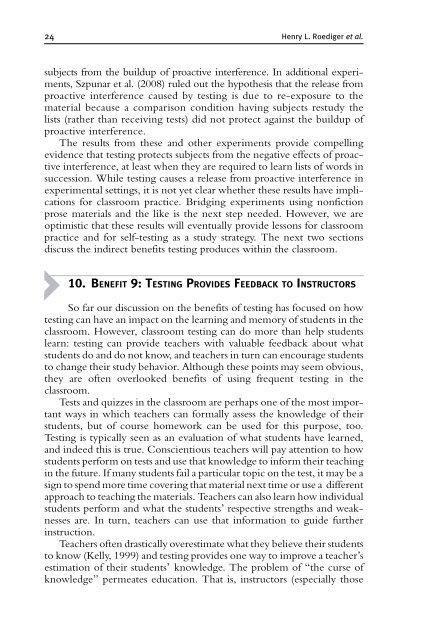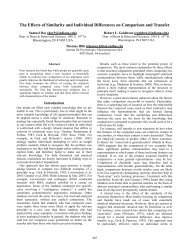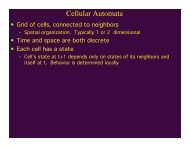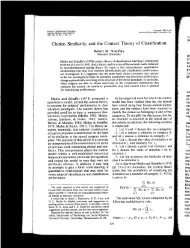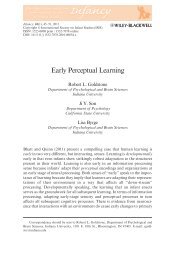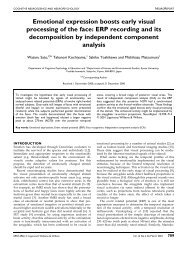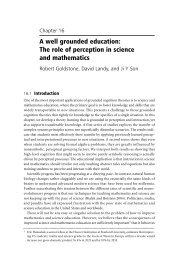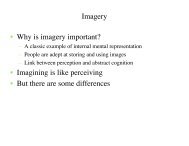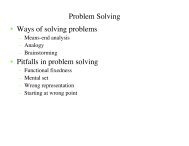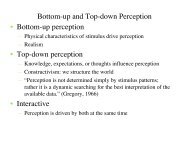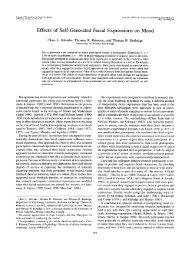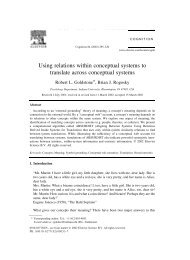the psychology of learning and motivation - Percepts and Concepts ...
the psychology of learning and motivation - Percepts and Concepts ...
the psychology of learning and motivation - Percepts and Concepts ...
You also want an ePaper? Increase the reach of your titles
YUMPU automatically turns print PDFs into web optimized ePapers that Google loves.
24 Henry L. Roediger et al.subjects from <strong>the</strong> buildup <strong>of</strong> proactive interference. In additional experiments,Szpunar et al. (2008) ruled out <strong>the</strong> hypo<strong>the</strong>sis that <strong>the</strong> release fromproactive interference caused by testing is due to re-exposure to <strong>the</strong>material because a comparison condition having subjects restudy <strong>the</strong>lists (ra<strong>the</strong>r than receiving tests) did not protect against <strong>the</strong> buildup <strong>of</strong>proactive interference.The results from <strong>the</strong>se <strong>and</strong> o<strong>the</strong>r experiments provide compellingevidence that testing protects subjects from <strong>the</strong> negative effects <strong>of</strong> proactiveinterference, at least when <strong>the</strong>y are required to learn lists <strong>of</strong> words insuccession. While testing causes a release from proactive interference inexperimental settings, it is not yet clear whe<strong>the</strong>r <strong>the</strong>se results have implicationsfor classroom practice. Bridging experiments using nonfictionprose materials <strong>and</strong> <strong>the</strong> like is <strong>the</strong> next step needed. However, we areoptimistic that <strong>the</strong>se results will eventually provide lessons for classroompractice <strong>and</strong> for self-testing as a study strategy. The next two sectionsdiscuss <strong>the</strong> indirect benefits testing produces within <strong>the</strong> classroom.10. BENEFIT 9: TESTING PROVIDES FEEDBACK TO INSTRUCTORSSo far our discussion on <strong>the</strong> benefits <strong>of</strong> testing has focused on howtesting can have an impact on <strong>the</strong> <strong>learning</strong> <strong>and</strong> memory <strong>of</strong> students in <strong>the</strong>classroom. However, classroom testing can do more than help studentslearn: testing can provide teachers with valuable feedback about whatstudents do <strong>and</strong> do not know, <strong>and</strong> teachers in turn can encourage studentsto change <strong>the</strong>ir study behavior. Although <strong>the</strong>se points may seem obvious,<strong>the</strong>y are <strong>of</strong>ten overlooked benefits <strong>of</strong> using frequent testing in <strong>the</strong>classroom.Tests <strong>and</strong> quizzes in <strong>the</strong> classroom are perhaps one <strong>of</strong> <strong>the</strong> most importantways in which teachers can formally assess <strong>the</strong> knowledge <strong>of</strong> <strong>the</strong>irstudents, but <strong>of</strong> course homework can be used for this purpose, too.Testing is typically seen as an evaluation <strong>of</strong> what students have learned,<strong>and</strong> indeed this is true. Conscientious teachers will pay attention to howstudents perform on tests <strong>and</strong> use that knowledge to inform <strong>the</strong>ir teachingin <strong>the</strong> future. If many students fail a particular topic on <strong>the</strong> test, it may be asign to spend more time covering that material next time or use a differentapproach to teaching <strong>the</strong> materials. Teachers can also learn how individualstudents perform <strong>and</strong> what <strong>the</strong> students’ respective strengths <strong>and</strong> weaknessesare. In turn, teachers can use that information to guide fur<strong>the</strong>rinstruction.Teachers <strong>of</strong>ten drastically overestimate what <strong>the</strong>y believe <strong>the</strong>ir studentsto know (Kelly, 1999) <strong>and</strong> testing provides one way to improve a teacher’sestimation <strong>of</strong> <strong>the</strong>ir students’ knowledge. The problem <strong>of</strong> ‘‘<strong>the</strong> curse <strong>of</strong>knowledge’’ permeates education. That is, instructors (especially those


